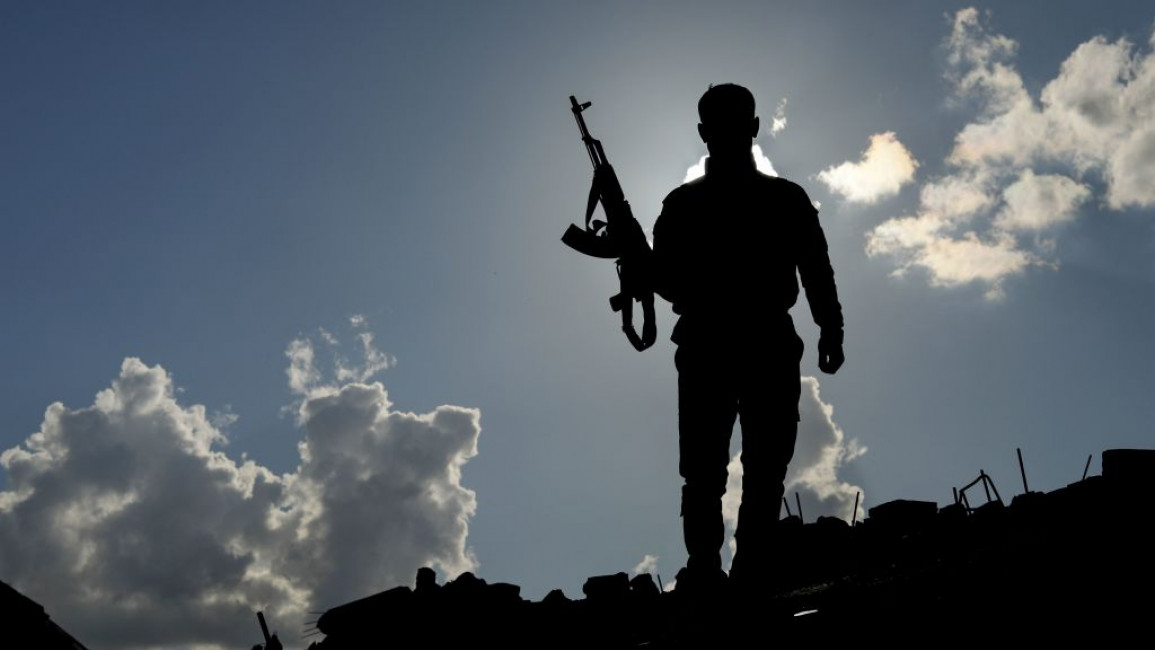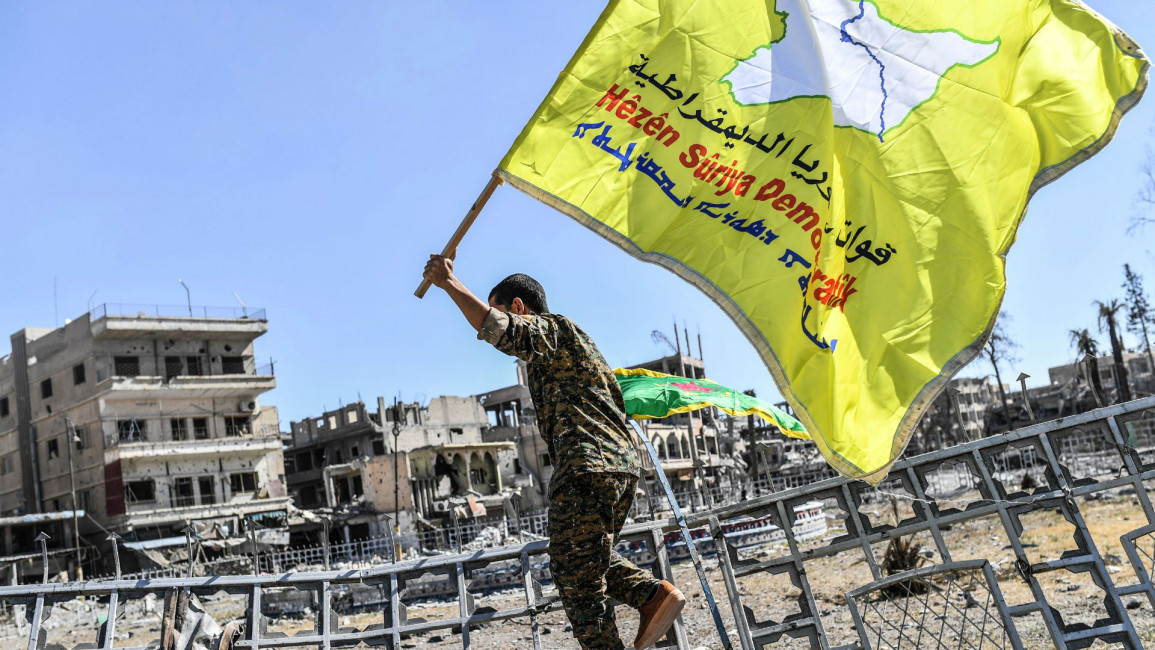
Domestic and foreign threats on the rise for Syria's Kurds

Born out of existential necessity during the fight against the Islamic State (IS) and the long-held dream of independence, today the future of the Kurdish statelet in north-eastern Syria looks increasingly uncertain as foreign and internal challenges threaten to destabilise the territory.
Domestically, tensions are on the rise. Last year Kurdish forces clashed violently with Arab tribes in Rojava. In March 2024, following a violent flare-up and spate of attacks on offices of the Syrian Kurdish National Council (SNC) - a Kurdish group part of the wider anti-Assad Syrian Opposition Coalition (SOC) - Washington’s Embassy for Syria called for a stop to the violence and urged all parties to engage in dialogue.
The Syrian Opposition Coalition blamed those attacks on militias of the Democratic Union Party (PYD), the ruling party in the Kurdish-run Autonomous Administration of Northeast Syria (AANES).
The AANES - usually referred to interchangeably as Rojava for the Kurdish region of Syria - is no stranger to crisis. But 2024 could be the statelet’s toughest year yet.
“One of the biggest concerns security-wise and politically is the role of Iran,” Dr Dastan Jasim, Research Fellow at the German Institute for Global and Area Studies, told The New Arab.
"The AANES - usually referred to interchangeably as Rojava for the Kurdish region of Syria - is no stranger to crisis. But 2024 could be the statelet's toughest year yet"
“That Turkey is an enemy of Rojava is obvious, but everything that is happening in the southern flank of Northeast Syria - a lot of people are having trouble grasping it.”
During the war with IS, the US-backed Syrian Democratic Forces (SDF) - dominated by the military arm of the PYD, the YPG (People’s Defence Units) - liberated swathes of territory outside of the traditional boundaries of Rojava, much of it populated by Arabs.
Today, those Kurdish-run Arab-majority areas recaptured from IS are surrounded by Iranian-aligned militias in Iraq and Syria, and Syrian government forces.
When it defeated IS, the SDF encroached on Iran’s hybrid control that it enjoys through Iraq and into Syria, Jasim explained. As a result, Iran is now waging a “cold war” against Rojava, using “secret services, intelligence, manipulation, sleeper cells” to weaken the Kurdish-held areas.
Jasim explained that, after the defeat of IS, while the “SDF was putting a lot of effort into the [Arab] tribes in these areas, Iran was doing the same - and they had established networks over there already”.
She said: “This internal-external aspect is going to be the biggest danger because whether it’s ISIS sleeper cells or Iranian militias using the situation, both are going to use disenfranchisement and a general sense of neglect or alienation of the Arab population”.
In September 2023, when Kurdish forces arrested a local Arab leader in Deir az-Zour, clashes between Kurdish forces and Arab tribes in Kurdish-administered territories claimed dozens of lives on both sides, and briefly spread across the country to Aleppo.
Jasim said: “[Rojava’s stability] is going to be a question of how much, internally, it can set the record straight with the Arab population, which is the majority, as well as when it comes to the greater question of Arab-Kurdish reconciliation”.
|
|
Another growing destabiliser is intra-Kurdish disputes. This year’s arson attacks on the offices of the SNC - which is Kurdish-run, but unlike the PYD proposes good relations with Turkey - as well as a spate of alleged killings and kidnappings by PYD militias, highlight the problem.
For Ömer Özkizilcik, a non-resident Fellow at the Atlantic Council and observer of Syrian politics, these intra-Kurdish issues are coming to a head because of proposed elections in April.
“The YPG/PYD is trying to establish its statelet in Syria. It wants to have elections and then try to gain some recognition from the Americans,” he said.
The problem, Özkizilcik argued, is that “these elections will be held just like elections held by the Assad regime. It is a one-party election”.
"If US protection ends and Washington's forces leave, if forced to choose between being controlled by Ankara or Damascus, the AANES would likely pick Damascus"
The proposed local elections have also drawn criticism from the SNC for failing to account for the thousands of Kurdish refugees dispersed globally. The PYD maintains that it is a democratic organisation and argues that the elections will be held democratically.
Özkizilcik said the arson and reported attacks on civilians are an attempt to silence opposition to the upcoming elections and strengthen PYD rule as it seeks to consolidate control and pursue Washington’s recognition.
For the analyst, the PYD’s governance of the territory is economically nonsensical (ignoring the existence of the world’s 17th largest economy on its border) and militarily dangerous because its alleged connections to the PKK provoke Turkey.
He argues the PYD is “destroying the potential of Syrian Kurds,” while “Turkey is looking for the window of opportunity to attack the YPG once more and to eliminate them militarily”.
While internal tensions continue to bubble, relations are deteriorating with Rojava’s neighbours.
Iraqi Kurdistan to the east is growing closer to Turkey, recently striking a deal to recognise the PKK as a security threat to Iraq and Turkey.
Turkish President Erdogan has signalled that a Turkish invasion of Northeast Syria could come at any time. Meanwhile, Turkish forces have, according to experts at the Carnegie Middle East Center, widened their air attacks in recent months to strike deeper into Syria, beyond the usual border region attacks.
Dr Mohammed Shareef, Professor of International Relations and Diplomacy at the Erbil-based University of Kurdistan Hewlêr, told The New Arab that now the US may be Rojava’s only saving grace.
“The US could do similar to what it did in the Kurdistan Region of Iraq after they toppled Saddam Hussein’s regime in 2003, essentially consolidate the Rojava administration by legalising it,” Shareef said.
|
|
“Through this approach, America will ensure they will have another loyal and reliable Kurdish ally in the region, this time based in Syria. Any formal agreement or declaration between Damascus and AANES or the legalising of the semi-autonomous entity through American mediation is definitely a viable option.”
Rojava is keenly aware of the need for US recognition. Since October 2023, it has paid a US lobbying firm $50,000 a month to “assist in setting the course for a more robust relationship between the Autonomous Administration of North and East Syria (AANES) and the United States”.
But if US protection ends and Washington’s forces leave Rojava, Shareef explained that if forced to choose between being controlled by Ankara or Damascus, the AANES would likely pick Damascus.
“But the third route is always American pressure on Ankara. Turkey would not disregard any strong US request to refrain from further military action, as clearly it would be unwarranted and justified,” he added.
“AANES is not nor could be of any serious threat to Turkey’s security or territorial integrity. Any military operations by Turkey in Rojava are based on unvalidated pretexts.”
Chris Hamill-Stewart is a freelance journalist and writer specialising in the business and politics of the Middle East and the Islamic world. He speaks regularly on current affairs in the UK.
Follow him on Twitter: @CHamillStewart



![President Pezeshkian has denounced Israel's attacks on Lebanon [Getty]](/sites/default/files/styles/image_684x385/public/2173482924.jpeg?h=a5f2f23a&itok=q3evVtko)



 Follow the Middle East's top stories in English at The New Arab on Google News
Follow the Middle East's top stories in English at The New Arab on Google News


